Replica Memorial Pole (RBCM 20124)

Replica Memorial Pole
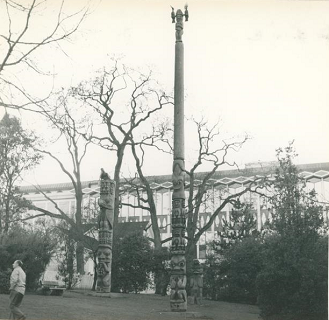
The replica pole in Thunderbird Park, 1978. PN 14072.
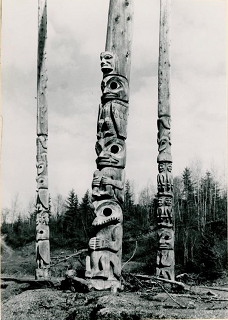
The original pole is at the right in this photograph taken at Gitsegukla in 1946 by T. W. S. Parsons. PN 3814-b.
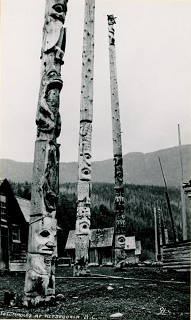
The original pole is third from left in this photograph of Gitsegukla. PN 11996.

The top figure of the original pole, Great Protruding (Being) from the Lake, in storage at the Royal BC Museum. (RBCM 15610 a)
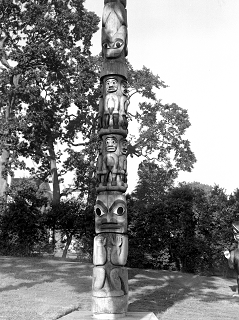
Detail of the newly installed replica pole in Thunderbird Park, 1954. I-26973.
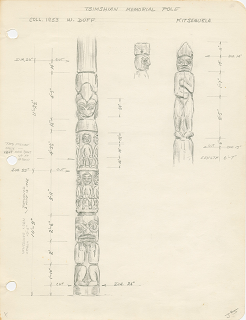
Drawing of the original pole called Great Protruding (Being) from the Lake by museum technician John Smyly, who restored it in 1966.
This is a replica of a pole from the Gitxsan community of Gitsegukla, formerly known as Skeena Crossing, in the Skeena River valley. When Gitsegukla was destroyed by a fire started by gold prospectors in 1872, the community relocated farther upriver. Two chiefs, Tu’pesu and Wawralaw, raised the pole at the new village site about 1885 in memory of the previous chief. The artist’s name was recorded as Hlamee. Curator Wilson Duff acquired the pole in 1953 (RBCM 15610 a-c) for the provincial museum. It was cut into sections for transport and is now in storage. Mungo Martin, his son David Martin, his associate Henry Hunt and Henry’s son Tony carved this replica in 1954.
The figure at the top is Great Protruding (Being) from the Lake. Its headgear, the Brave’s Helmet, has two carved birds, called Real Kingfishers, perched on a stick that runs through it. Below an uncarved length of pole is Hanging Frog, a crest referring to the history of Neegyanks, a chief’s daughter who disappeared one night. Two years later, frogs appeared in the chief’s doorway and led people to a nearby lake, which they drained. A large number of frogs emerged and fled. When Neegyamks died her father killed a large frog and took it for a crest to commemorate the event. Below Hanging Frog are small human figures, Three-Beings-Across (shown twice), wearing cedar bark head rings. A crest called Reflections in the Water is at the bottom. While crossing a lake on a raft, a woman and her family saw faces of children in the water and adopted the reflections (or shadows) as a crest. The woman and the children she saw in the water are shown on the pole.
Mungo Martin and his family members created the new version of the pole for Thunderbird Park. Although they were Kwagu’ł from Fort Rupert (Tsaxis) and brought up in the Kwakwaka’wakw artistic tradition, they worked to understand and interpret the styles of the Gitxsan and other First Nations whose poles they replicated in the Thunderbird Park carving program.
Do you have a story to share about this item? Add your voice to the community.